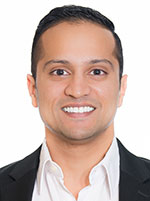
Despite the recent downturn in the economy, dentists still do very well financially. The Bureau of Labor Statistics reports that the annual mean wage for dentists was $173,860 in 2016, with an overall range of $52,060 to $236,130. Associate dentists in our group earn from $120,000 to upward of $350,000 per year.
So how do you surpass the national average? I interview hundreds of candidates every year for a very small number of open positions in our company, and the interview is the by far the most important part of deciding who will get the position to join our team. So how do you really nail the interview for an associate position?
Do Your Research
Nothing surprises me more than when I ask potential dentists if they have heard about us, and they say “no” or “I have heard a little.” Oftentimes, a practice’s website has more than enough information you need, so go in prepared.
There is no better way to learn about an office culture than to look up its social media page. We link our social media pages to our homepage and keep the content very up to date, so the more you know about us, the more you will stand out and make a genuine connection with the interviewer.
Look the Part
From head to toe, you should dress to impress. Treat your job interview as if you were about to see a good friend after a long time. Take extra effort with your hair, nails, and clothes. Every detail counts, and it does not go unnoticed by the interviewer.
If you are not sure if you should wear a suit and tie or a pantsuit, remember that it is always better to be overdressed than underdressed. Do not wear scrubs to an interview. Your goal is to stand out among your colleagues, so wearing something more professional will go a long way to get people to remember you.
Arrive on Time
Always show up at the interview 15 minutes early and expect to wait. Remember, arriving early does not mean you should be seen early, so do not get impatient. If you are seeking a highly competitive position, keep in mind that you probably aren’t the only candidate interviewing for the job.
Observe the Waiting Area
This is something many people never think to do. Use your time in the waiting room wisely by looking around. Are there any plaques on the wall, magazine articles, or community service mentions? Study them and bring them up during the interview. It shows a great level of attention to detail and a genuine interest in how you can contribute to a practice’s goals.
Avoid Snacks and Refreshments
Pass on gum, coffee, or snacks when offered. You don’t want to deal with spills, stained teeth, or bad breath. Also, you never know when you will be called, and getting caught spitting out gum or chewing on a snack is not an ideal first impression. If you want something, stick with water.
Plus, you can use water as tool. If you get a tickle in your throat, persistent cough, or dry mouth because you are nervous during the interview, take a sip and regroup. Or if you’re asked a question and need a moment to think about an answer, take a sip, collect your thoughts, and then respond with confidence.
Ask for a Tour
Even if it isn’t offered, ask for a tour of the office. This gives you a quick glimpse of the working environment and an overall assessment of the people who work there. Is everything clean and organized? Do the employees look happy and dressed well? Are people smiling? Does everyone look busy working, or are they sitting around on cell phones? Just a quick look around can give you a great idea of the culture in the office.
Be Personable
Your resume will look like those of many other applicants, no matter how hard you try. Be prepared to stand out from the rest, and make sure your personality shines during the process. This may mean saying something the average candidate would not talk about. I cannot emphasize enough the importance of finding your own angle. Talk about why you chose your profession, but give it a unique twist that people will remember.
Be sure to also smile throughout the interview as much as possible. A smile truly is infectious and will always carry over to the interviewer. Also, don’t forget solid eye contact and a firm handshake, which will confirm you are confident in yourself and your answers.
Be Prepared to Answer Basic Questions
You should be prepared with answers to the following 3 questions, which every candidate should expect:
- Tell me a little about yourself. Nothing is more surprising to me than when someone is not prepared for this first question. I do not need you to verbalize your resume back to me. Rather, focus on its highlights and tell me something that can engage our conversation. Maybe there is something that does not have to do with work. I really want to know how well you can hold a conversation because you will meet new patients daily, and how well you can establish a conversation with a stranger will demonstrate how well you will be able to relate to your patients.
- How did you hear about us? Do not just say, “I looked you up online.” Mention something about the company or the office that impressed you enough to apply. Was it the office’s reputation or reviews? Its community involvement? If you know someone who has worked for the practice, do not be afraid to use that name to your advantage.
- What is your greatest strength (or weakness)? A question I always ask in conjunction with this query is “We have more than 20 candidates just like yourself applying for this one open position. Why should I choose you?” Be ready to explain what makes you different from your colleagues.
Come Prepared With Your Own Questions
You should always have at least one question of your own. It shows you are fully engaged and want to know more. If you are uncertain what to ask, a great topic to ask about is the office’s long-term vision. Then, be prepared to explain how you can help achieve these goals.
Ask About the Company’s Community Involvement
It is always refreshing to meet people who want to contribute to the community. But the key here is to be specific. Do not just tell the interviewer you want to “give back” too. Take time to research community events that the office may be involved in. Mention them and how you would love to get more involved, and you will surely stand out.
Be Cautious When Asking About Salary
Interviewers know it is on your mind, so wait for them to bring up pay, and then ask questions. If it does not come up, do not let it be your first question. No one wants an employee who is only focused on money. If you need to ask, phrase the question like this: “Thank you for answering all my other questions. One thing I do not recall us discussing is salary. Can we discuss that before I leave?”
Follow Up
If your interview was set up by a recruiter, ask your interviewer for a business card. Send a thank you email the same evening and, later, a personalized, handwritten thank you card.
I have gotten a lot of thank you emails, but surprisingly, in 8 years, only 4 out of more than 300 applicants have personally delivered a handwritten thank you card to our office.
One time a candidate and I talked about children during the interview, and I mentioned that my son had an upcoming birthday. The candidate’s follow-up handwritten thank you note included a message wishing my son a happy birthday. This candidate got the job
 Dr. Patel is one of the owners and the chief clinical officer at DECA Dental Group. He oversees new doctor recruiting and has created unique and innovative systems to train hundreds of dentists in more than 60 office locations across Dallas, Houston, San Antonio, and Austin. He can be reached at patel@decadental.com.
Dr. Patel is one of the owners and the chief clinical officer at DECA Dental Group. He oversees new doctor recruiting and has created unique and innovative systems to train hundreds of dentists in more than 60 office locations across Dallas, Houston, San Antonio, and Austin. He can be reached at patel@decadental.com.
Related Articles
Dental Grads Encouraged to Consider Associate Positions
Clinicians Discuss Dentistry’s Showing on Recent “Best Jobs” Reports











